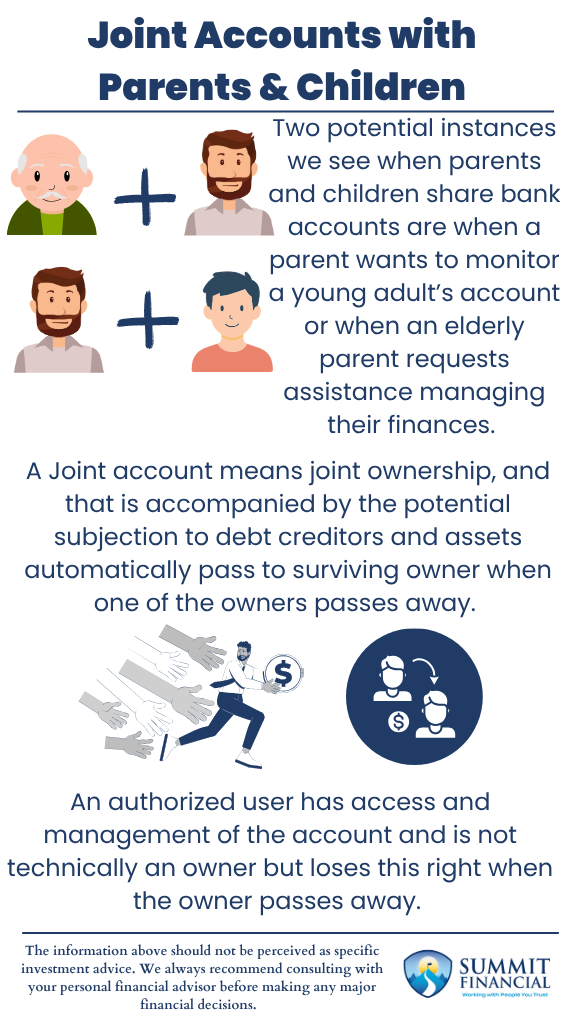We believe one of the common mistakes we see among our clients is when they decide to open a joint bank account between parents and children.
Two potential instances in which parents and children share bank accounts are when a parent wants to monitor a young adult’s account or when an elderly parent requests assistance managing their finances. While the intentions are certainly in good spirits, there are potential downsides that we do not believe many are aware of when they undertake this account structure.

Monitoring Young Adults’ Spending
With the first example, we tend to see a lot of minors open joint accounts with their parents as a way for the parents to have the ability to monitor spending. While the child is a minor, we do not believe there are any key issues with this.
However, we do see that even when the child becomes 20, 25, or even 30 years old that the parent is still listed as a joint owner. This is when the concern becomes greater in our opinion.
At this point, the child should be more self-sufficient and should not need the direct supervision of their parent. And if they want their parent’s help with their finances, they can easily share statements and information with them outside of the parent being a joint owner on the account.
Helping Elderly Parents with Finances
The second situation that we believe is common is when a parent becomes elderly and would like their child’s assistance with managing their finances. Creating a joint account is seen as an easy way for the child to access the account to help pay bills or track income and expenses. In both of these examples, convenience and transparency are the primary intentions of the joint owners (www.chase.com).
However, we believe there are downsides that should be considered before utilizing this account structure.
Operational Challenges with Joint Owners
First, an issue that we tend to run into is that having a joint owner may require both signatures to process certain transactions or requests from the account. We have had account paperwork be held up before since adding a bank account to an investment account requires us to receive signatures from all of the bank owners. Sometimes this is an easy solution, but sometimes tracking down that joint owner signature can be a hassle, especially if they do not live nearby.
Creditor Risks for Both Owners
Next, the biggest concern we have with this account structure is the potential for creditors of each owner to potentially pursue the account assets in the event of a lawsuit (www.elderlawanswers.com).
If an elderly parent owns an account jointly with their child who defaults or falls behind on their debt, that creditor could come after the joint account even though the assets were originally only the parent’s and not the child’s.
At that point, both parties own the assets, so the creditors of both parties may pursue the assets. This issue may arise during a divorce as well if the ex-spouse decides to pursue the assets within the account even if they too know that the account was originally the parent’s and not that of their spouse (www.elderlawanswers.com).
Impact on Medicaid Eligibility
Another issue may potentially be Medicaid eligibility, whether it is qualifying for health insurance or long-term care insurance. Having a certain level of assets may disqualify an individual or family from receiving Medicaid benefits and these joint accounts would technically be included in that asset count (www.elderlawanswers.com).
This is not as common of an issue, but it is certainly something to be aware of since it could create a financial burden on someone who should have qualified for state-sponsored benefits.
Estate Planning Challenges
Lastly, we wanted to mention the concern of estate planning and how the joint owner of an account will typically receive the assets in their name when the other owner passes away (www.chase.com).
This is a concern because sometimes the original owner has other plans on how to distribute the assets in their account, but joint ownership would overrule any will, trust, or even beneficiary designation on the account.
For example, things can become complicated when an elderly parent has a joint account with only one of their children for the financial management assistance, but then this account may disinherit any other siblings since it would solely pass to the joint owner instead.
Authorized Users as an Alternative
We believe a more efficient solution would be to set up the account with an authorized user instead of a joint owner. The authorized user/signer would have full access to the funds within the account, but does not technically own the assets, so it would avoid the issues we described above (www.westernbank.com).
This allows for the monitoring and spending of the account assets, which may be beneficial for both parties to share. However, when the account owner passes away, the authorized user would lose their rights to the account assets, as the funds would be distributed in accordance with any estate plan.
Importance of Estate Planning Documents
This is one reason we believe it is important to have estate planning documents in place, so that your assets pass in a timely and, hopefully, smooth manner, rather than having no guiding documents. It is important to review your specific goals as they relate to account titling and estate planning, as well as all potential pros and cons. This blog is our attempt to continue to provide more financial education, which we believe is an often-overlooked area of knowledge.
Key Takeaways: Share Bank Accounts
- Two potential instances we see when parents and children share bank accounts are when a parent wants to monitor a young adult’s account or when an elderly parent requests assistance managing their finances.
- A Joint account means joint ownership, and that is accompanied by the potential subjection to debt creditors and assets automatically pass to surviving owner when one of the owners passes away.
- An authorized user has access and management of the account and is not technically an owner but loses this right when the owner passes away.
Speak With a Financial Advisor
If you have any questions about your investment portfolio, retirement planning, tax strategies, our 401(k) recommendation service, or other general questions, please give our office a call at (586) 226-2100. Please feel free to forward this commentary to a friend, family member, or co-worker. If you have had any changes to your income, job, family, health insurance, risk tolerance, or your overall financial situation, please give us a call so we can discuss it.
We hope you learned something today. If you have any feedback or suggestions, we would love to hear them.
Sincerely,
Zachary A. Bachner, CFP®
with contributions from Robert Wink, Kenneth Wink, James Wink, James Baldwin, and Daniel Ladzinski
If you found this article helpful, consider reading:
- Ensuring Peace for Your Beneficiaries: Estate Planning Essentials
- Estate Planning for Blended Families: Protecting Your Wishes Across Complex Family Structures
- Choosing a Beneficiary for Your Retirement Account
- Understanding SECURE 2.0: New Rules for Beneficiaries of Retirement Accounts
- Understanding Per Capita vs. Per Stirpes Beneficiary Designations in Estate Planning
Sources


